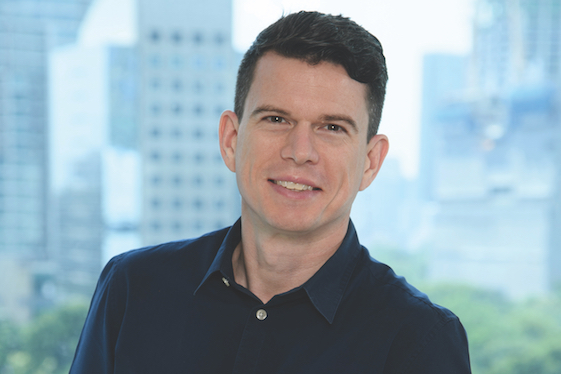Being a hotel company sustainability leader, as well as an animal and nature lover, while living in Bangkok is not so easy. Just ask Jeff Smith, vice president of sustainability for Six Senses Hotels Resorts Spas, who grew up outside Toronto watching nature shows.
So while surrounded by hustle and bustle, Smith walks to Six Senses headquarters every morning, refuses to buy a car and spends weekends searching out green spaces.
“I struggle with the urban environment, to be honest,” says Smith, who has been leading Six Senses’ environmental efforts for three years. “I try to live plastic-free. I say no to plastic bags a couple of times every day. I won’t use takeaway containers for food. I eat in restaurants or I eat at home.” He adds, “We make those choices or we don’t. I think of it very philosophically in terms of those choices.”

Smith takes that clarity of purpose to work as he develops his role at a hotel management company. He has a master’s degree in environment and sustainability and a technical background in environmental engineering, ecosystem risk management, municipal planning and elephant conservation.
The NGO approach
Smith says he is figuring out how to best work with asset managers and owners who control expenditures and prefer ROIs realized sooner rather than later. He has also developed a fresh approach to his department.
“I look at us as an NGO (a non-governmental organization) embedded inside a hotel group,” he says. “Often, you never have the budget you want. You never have all the resources you need. No one could have enough resources to do what we’re trying to do. We work within constraints, but we do the best we can, and it’s about being tactical and about being strategic.”
“Jeff lives, breathes, cares about all things sustainable,” says Six Senses CEO Neil Jacobs. “He’s a sustainability evangelist while understanding, embracing and celebrating with his sustainability managers small successes as well as the big stuff. Jeff is our conscience, our sustainability police, and he keeps us all focused.”
The nuts and bolts of Six Senses sustainability program continue to revolve around reducing energy, water and waste. “We track it across our portfolio and we also benchmark that data through a great program created at Cornell University that is available for any hotel to use,” he says.
The benchmarking helps, Smith says, to build the business case for adoption. “Any opportunity we can to have those conversations about what we’re doing for energy, for example: ‘This is where comparable hotels are, and if we were to move up or down that comparative benchmark scale, how much money would we save per year.’ That’s our role – to track savings and ROI.”
An example of Smith’s approach can be found in the Maldives, where Six Senses is conducting marine conservation work, teaming with 10 marine biologists who have created a research institute at the resort site to study fisheries management and conservation of manta rays and turtles. The years of research, in fact, is moving upstream to the Maldives government to help plan and establish protected areas. The biologists have also set up protocols for watching dolphins, and that work led to the creation of a recognized tourism protocol.
“It’s all science-based, which I think is fantastic,” Smith says. “It’s not like a fluffy hotel CSR thing. It’s real scientists doing real research to get published in journals.”
First-hand impact
On a broader scale, Smith says in 2016 his team eliminated plastic straws at the company and is now taking on an initiative dubbed Plastic Free 2022. Sponsored projects in 2017 totaled US$507,631.
He also coaches team members to get in front of guests and make sustainability initiatives interesting for them. “Everyone will get behind you as soon as they see the guest taking interest,” Smith says.
His other advice: It’s impossible to measure progress if it’s not measurable. “You can’t celebrate wins if you don’t know what a win looks like. That would be my advice for contemporaries in the corporate level or head office level.”
Jennifer Klar, who is moving from Six Senses’ corporate office to take on her first property-level role, running the sustainability program at Six Senses’ Qing Cheng Mountain property in China, was struck by how Smith got invited by the World Bank to Nepal to talk about sustainability with government parties and potential investors.
“He’s established himself in the role of being a leader in sustainability,” she says. “Prior to working for Six Senses, my knowledge about sustainability was very theoretical and mostly based on research. He was the first person to introduce me to a more practical approach and has introduced me into a complete new world of how to conduct hotel business.”

